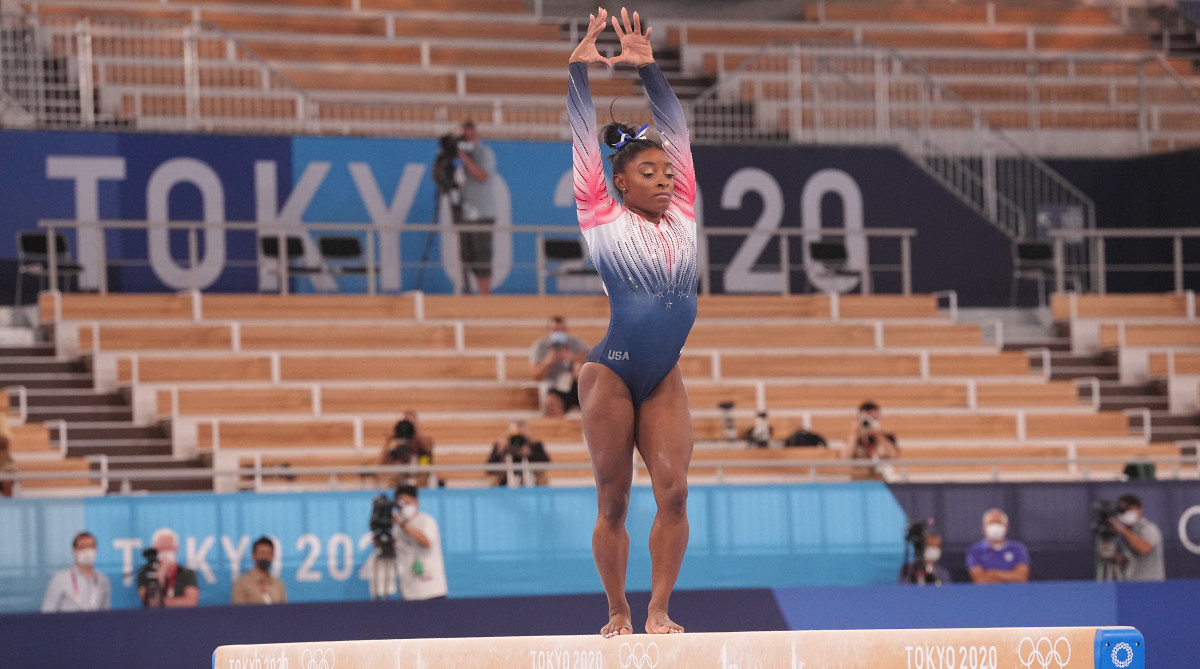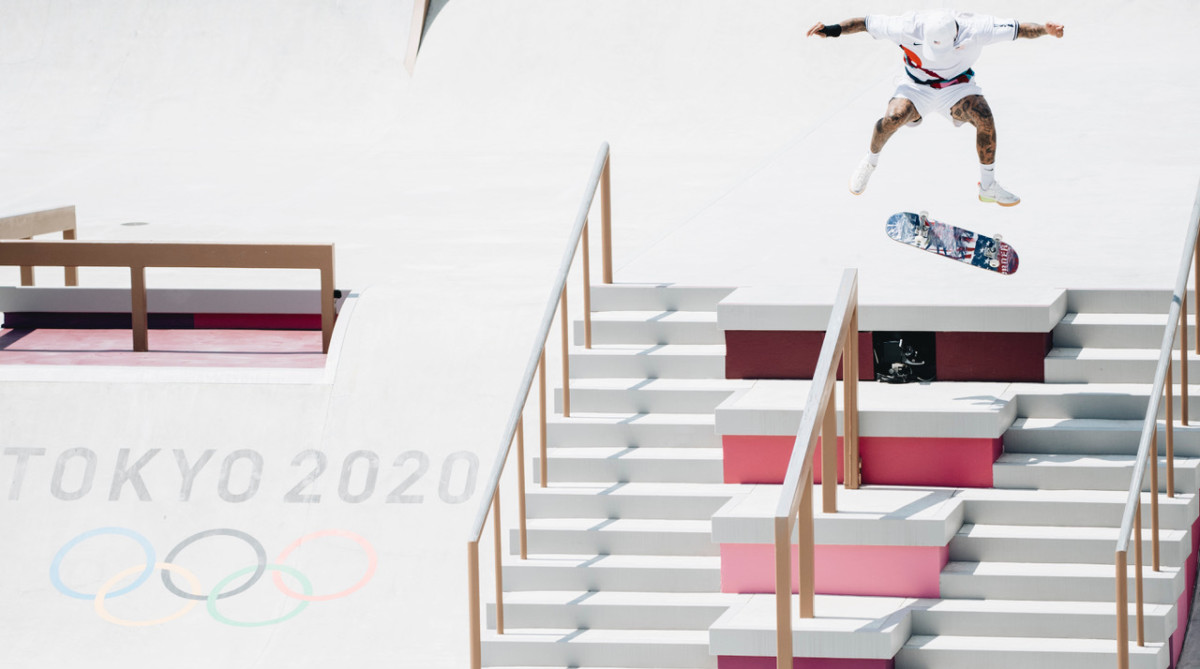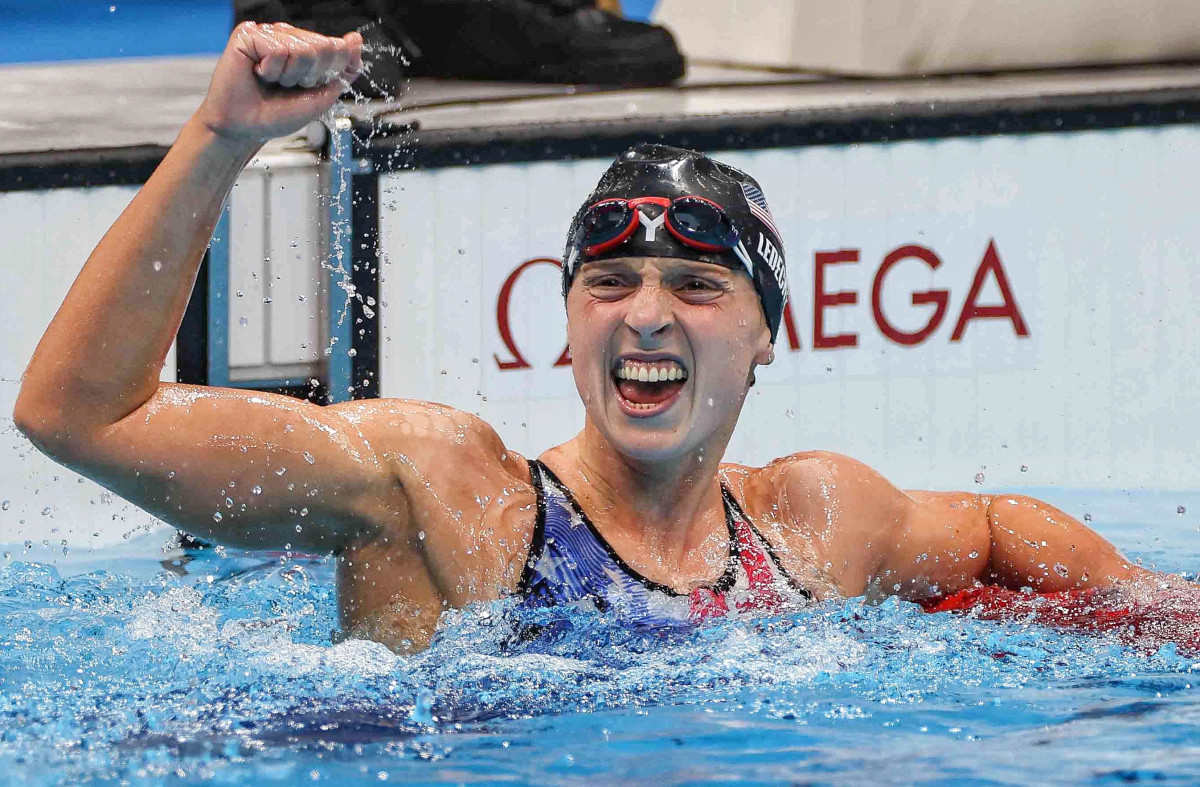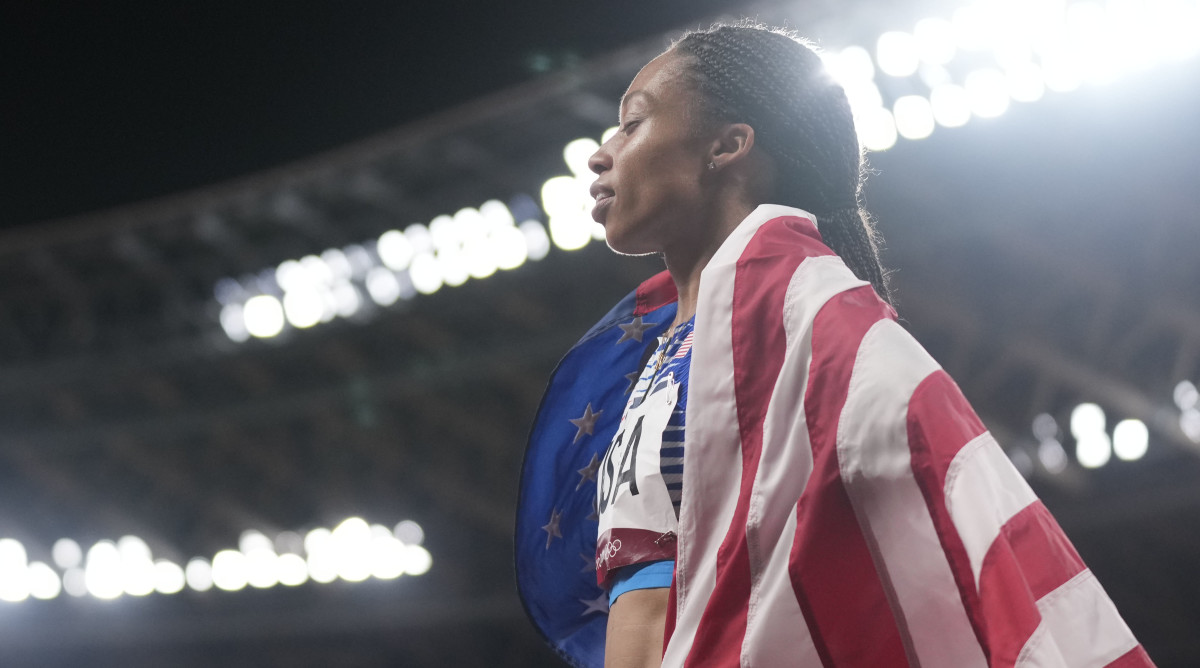The 10 Things That We Will Remember About Tokyo 2020


If you ask 100 sports fans, Family Fued–style, what they remember about the Rio Olympics in 2016, I don’t think you’d get very far down the board before arriving at the fact that the pools turned green. I bring this up now, as the sun has set on Tokyo 2020, because I’m thinking about what sticks in our collective minds.
All-time great athletes and legendary performances, sure. But sometimes it’s just the novel and the strange. The thing you’d never seen before.
So what will stand out five or 25 years after the strangest, least-watched Olympics of my lifetime? We can’t answer for sure, but I think we have a pretty good idea.
Here are 10 things I think we as a collective group will remember about the 2020* Olympics.
1. The COVID-19 pandemic. The No. 1 story on earth the last 18 months is unavoidable on a list like this. These will always be the Pandemic Olympics. They were held in a state of emergency, in a country whose citizens mostly didn’t want them. The IOC continued to call them the 2020 Olympics, even though 2020 ended more than seven months ago. It feels like an effort to make us forget what happened when, decades from now, we look back at lists of Olympics and their corresponding years. Or maybe they just didn’t want to spend money on new signage. But no one who lived through these times will ever forget.
We might forget some of the details. That the very first beach volleyball match of the tournament got canceled. That an American pole vaulter flew in as a last-minute alternate after another tested positive. That an entire synchronized swimming team got yanked from competition. That two judokas got sent home for leaving the athlete village to go sightseeing. That people could hear protestors outside the mostly-empty stadium during the Opening Ceremony.
But we will never forget the images of empty stadiums, or athletes masked up on the podiums and putting medals around their own necks (or their teammates’), or the way NBC connected winners with their families on Microsoft Teams after their events.
Hopefully this all stands out as unique, because we never have to do it again.

2. Simone Biles. We knew going in that the greatest gymnast of all time was capable of being the biggest story of the Games, and she ended up at the center of a bigger story line than maybe we could have even imagined.
It was shocking in the moment, when Biles pulled herself out of the finals of the Olympic team competition, but it made much more sense once we learned about what was going on. Biles was struggling with the twisties, which presented a very real danger to her own personal well-being and her team’s score. So she bowed out, cheered on her teammates and kept working behind the scenes in a secret location until she could return to competition and win a bronze medal on the balance beam.
She will always be remembered for her five-medal performance in Rio, but she will now also be remembered for what she did in Tokyo. Will you ever watch gymnastics the same way again? Now that the general public knows so much more about the twisties? Now that elite gymnasts have explained, in much more detail, to a much more receptive audience, the dangers of the sport?
Biles started a conversation that is much bigger than gymnastics. About athletes and pressure and mental health. And she did it with the weight of the world on her shoulders. It is a conversation that will continue long after her gymnastics career. And while I have said multiple times now that the narrative of her Olympics should not be centered on the fact that she won a bronze medal after she returned, she did leave us with one last performance to remember.
3. Suni Lee. With Biles out of the individual all-around, someone else had to win it. And it was Lee, who became the fifth straight U.S. gymnast to win the coveted title. She already had a story that made people want to root for her—a teenager, the first Hmong American Olympian, dedicating her Olympic gold medal to her paralyzed dad.
But she also etched her name into gymnastics lore at a fortuitous time. As many pointed out during the Olympics, she will enroll at Auburn this fall. And thanks to new name, image and likeness rules, she will be able to compete for the Tigers and make a ton of money while doing so. It is possible Lee will become a poster child of the NIL era, visible in both national TV commercials and NCAA championships, written about when we retell both Olympic history and the story of a new era in college sports.
We would remember her performance anyway, but the Olympics just happened to make her a superstar at a very good time to be a superstar college athlete.

4. The new sports. The Olympics are changing. This edition saw an expanded list of sports, with five chosen by the host country, a precedent that will continue moving forward. I think these Olympics will be remembered both for putting that innovative idea in place, and for the actual sports that made their debuts. Sport climbing, skateboarding and surfing all seemed pretty well received, from I could tell, and will all be back in Paris come 2024. I think they all have staying power beyond that, and we may remember these three joining as a block. The other two are karate (which I don’t think we’ll see for a while) and baseball/softball (which will not return in Paris but will be a top contender for future Olympics). The other new sport in Tokyo was 3x3 basketball, which is technically a core sport now and was not chosen by Japan’s organizing committee. But if those four sports remain in the Games long-term, they may all be remembered together and the distinction could be lost.
Anyway, as the Olympics tries to evolve and grow its audience, these Games definitely gave us some new sports that breathed some life into things. One remaining question, in the aftermath of so many teenagers on the skateboarding podium: Will we see them replaced by even younger teenagers or will this first crop stick around until, say, Brisbane 2032?
5. Caeleb Dressel. Dressel was given a nearly impossible task: Succeed Michael Phelps as the greatest male American swimmer at the Olympics. He answered the call by taking on an ambitious racing schedule, winning five gold medals, and setting two world records and two other Olympic records.
He did more than just follow Phelps. He stepped in and established his own legacy. But he was truly great enough to be remembered for both his own accomplishments and for grabbing the torch from his predecessor. Dressel is only 24 years old, which means he will have a chance to climb even higher on all sorts of career record lists in Paris. And he will be an even bigger name when he gets there.

6. Katie Ledecky vs. Ariarne Titmus. Ledecky was singular and incredible in 2016. Our lasting images from Rio are not of her being surrounded by the world’s best swimmers, but of her on the other side of the pool, finished, waiting for them to catch up. Ledecky was not as dominant in 2020, though she was still very successful, winning two golds and two silvers.
But sometimes we remember an athlete because of a foe they are linked to, and Titmus proved to be a worthy adversary.
Titmus won gold in their first showdown, the 400-meter freestyle, and it added a charge of drama to the pool each night, knowing the invincible Ledecky could be beaten (though close observers knew how formidable Titmus would be in that in race). Then she won the 200, with Ledecky finishing off the podium.
After that, Ledecky came back to win the 1,500 later that night (a race Titmus didn’t enter). Then she swam the anchor leg of the 4x200, launching the U.S. past the Australians to claim silver, after Titmus had swum their first leg. Ledecky capped things off by beating Titmus to win gold in the 800.
People may forget the order of the races, or even who won which, but I think we’ll remember Ledecky and Titmus going toe-to-toe. The GIF of Titmus’s coach will make sure of it.
7. The high jump tie. I loved everything about this. Italy’s Gianmarco Tamberi and Qatar’s Mutaz Essa Barshim matched each other jump for jump and then the two friends decided to share the honor of gold medalist. What followed was one of the best reactions I have ever seen, particularly from Tamberi. I wrote about how NBC didn’t do this moment justice in primetime, but his reaction will live on. It was not as exciting if you weren’t streaming it on the app at 8:30 a.m. ET, but years from now, like the Sinbad genie movie, people will convince themselves they saw it. This was an all-timer.
There were many incredible moments in track and field. Karsten Warholm leapt off the screen when he broke a longstanding 400-meter hurdles record. The Sydney McLaughlin vs. Dalilah Muhammad race was electric. But I think the high jump tie will endure. No offense at all to Warholm. But Wayde van Niekerk’s 400-meters win from lane 8 was astounding in Rio, and I think most casual fans have forgotten why that name sounds familiar. (No offense to van Niekerk either!)
But you don’t forget something like two dudes finishing tied in the high jump and then one of them leaping into the other’s arms and then rolling around on the track next to his old cast.

8. Allyson Felix. Felix is the most decorated U.S. track and field Olympian ever, and the Tokyo Olympics not only enabled her to claim that honor but gave her the perfect sendoff.
I think we’ll remember the way she led the conversation about motherhood and the sponsorship of female athletes in much the same way we’ll remember how Simone Biles turbocharged a conversation about mental health.
Felix is 35, competing in her fifth Olympics and the first since giving birth to her daughter in 2018. This came after she wrote an op-ed in The New York Times about how Nike wanted to pay her 70% less after childbirth and wouldn’t guarantee her deal if her performance slipped. So she ditched Nike, came to the Olympics and won an individual bronze and a relay gold—Nos. 10 and 11 of her career. That is the stuff of legend.
This was an incredible year for Team USA’s women, who won plenty more medals than their male counterparts. Felix showed she was as powerful as any, on and off the track.
9. Gable Steveson. I’m making a bit of a futures bet here, given that wrestlers don’t often cross into the mainstream sports consciousness. But if you watched Steveson in Tokyo, you may agree he is worth betting on. He is named after a former Olympic champion. He then won his gold-medal match in astounding fashion and cartwheeled his 275-pound body into a backflip.
He also speaks openly about wanting to join the WWE, and why on earth wouldn’t the WWE want him? I think Steveson can parlay the gold medal and the backflip into quite a bit of fame and fortune. Ten years from now, you will be aware of him even if you don’t watch professional wrestling, when he is presenting an award at the ESPYs to help promote his new Disney action movie where he has to rescue his mentor, played by Dwayne The Rock Johnson. And you will know that he became famous at the 2020 Olympics, even if you didn’t watch the match.
10. The time zone. It’s a running bit at this point that people complain about NBC’s coverage every Olympics. But you can have legitimate gripes about the network’s decision to air USA men’s basketball games on Peacock, or to show certain events in prime time long after people knew the results, and still sympathize that one of the major problems for the audience was that too many of the events were on in the middle of the night.
In time, I think many of the complaints (like so many things on this list) will blur or fade. Peacock is probably here to stay, whether you like it or not. Fewer people watched the Olympics than ever before, but many years from now people won’t remember their specific grievances about which streaming platforms they had access to at the time or which events were on in the morning. Americans will just remember Tokyo was one of those years when the time zone made it hard to follow everything and they didn’t watch as much.
There were many other things I considered listing. This was probably the end of an era for the USWNT, a team so many people have loved dearly during this run with Megan Rapinoe, Carli Lloyd and other stars whose careers are winding down. But I think that incredible team will be remembered more for their wins over the last decade than their losses.
Sue Bird and Diana Taurasi won their fifth Olympic gold medals, which is outrageous, but I also think we are spoiled by the U.S. women’s basketball team. It has won so much that the seven straight gold medals and 55 straight wins likely blend together for most people. The men’s basketball team faced questions about to what degree the rest of the world has caught up, and then won gold—again.
I hope I never in my life forget being awake at 3:00 a.m. to watch seven golfers finish in a tie for a third and compete in a playoff for a bronze medal. Seven! Outrageous.
Molly Seidel finished third in the third marathon of her life. Tamyra Mensah-Stock gave this incredible interview. The triathlon had to restart the race because a boat was blocking half of the swimmers from diving in at the starting line!
There were new mixed gender team events, and historic golds for Team USA in volleyball, fencing, canoeing and track cycling.
It was a lot. The Olympics were a whirlwind. They always are. Just an unceasing parade of characters and story lines and perseverance and spirit. Packaged on television with videos that make you want to root for their whole families and communities. They cram so much into 16 days. We will forget most of it just in time for the next one to come along. But plenty will endure, which is why so many of us keep coming back.
All that said, if you look at items No. 1 and No. 10 on this list, it paints a fairly grim picture by which to remember these Olympics. There were a lot of incredible moments along the way, and many people found reasons to love the Tokyo Games, but we can still acknowledge they were not the most popular Olympics we’ve seen.
Still, as I wrote before they started, the athletes always deliver. And they did give us plenty to remember.
More Olympics Coverage:
• Final Takeaways from the Tokyo Olympics
• Handing Out Awards for the Tokyo Olympics
• U.S. Men's Boxing Denied Gold Once Again at Tokyo Olympics
• With First Olympic Gold, U.S. Volleyball Hopes to Set Standard for Future
